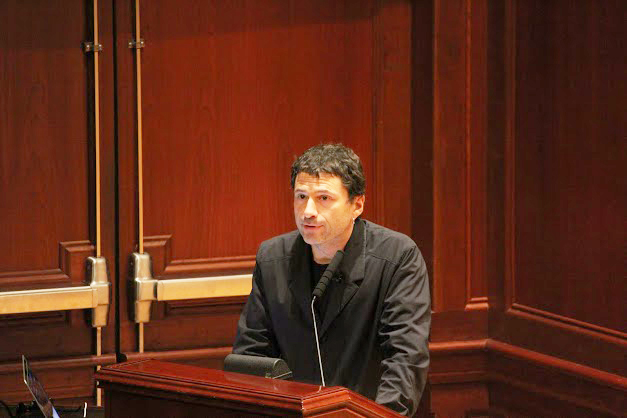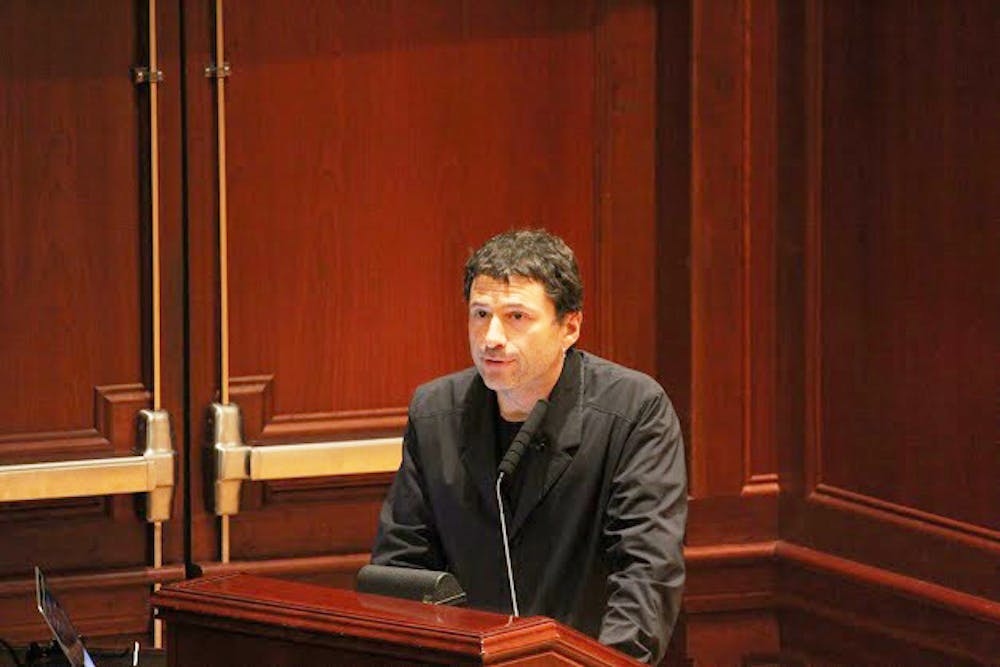By Kelly Vena
Correspondent
Ed Keller, professor at Parsons The New School for Design, seems to have done it all — design, architecture and even rock climbing. However, his favorite pastime by far is music.
“Guitar has been a tectonic-like event in global culture,” Keller said at the Friday, Sept. 25, Brown Bag Series in Mayo Concert Hall. “It cuts across millions of people’s consciousness.”

Throughout the presentation, Keller displayed pictures of various contemporary guitars to emphasize the clash between modern technology and traditional guitar design.
“The electric guitar took pattern designs from lutes thousands of years old,” Keller stated.
A lute is a stringed instrument with a long neck and hollow back. The instrument dates as far back as ancient Mesopotamia, where art has been discovered depicting people playing lutes that look strikingly similar to modern-day guitars.
According to Keller, guitar designers “look back four to five centuries (for structural ideas), yet rely on modern technology to make new things.”
Based on the various guitars shown in his presentation, this statement seems to hold true — most contemporary guitars retain the same shape as older models, but have original qualities to enhance different elements of the instrument by utilizing today’s innovative equipment.
To demonstrate this concept, Keller presented the audience with a picture of a Strandberg guitar, a Boden OS 6. Strandberg is a popular modern guitar designing company. The guitar has an odd curvature at the bottom to make it more comfortable to play while sitting down. The guitar also has no headstock, the topmost part of the neck that holds the tuning pegs. Rather, the tuning pegs rest on the body of the guitar, below the strings.
This aspect of the Strandberg, albeit “widely disliked by guitarists,” according to Keller, is meant to improve sound quality. However, the model maintains the structure of guitars from the 20th century in order to make it simple for manufacturing, and thus cheaper to reproduce and distribute widely.
Keller was also fascinated with video games such as “Guitar Hero” and “Rock Band.”
“Rock games challenge the ways we imagine music should be played,” he said.
Video game designers have made playing instruments an overly-simplistic process that seemingly anybody could learn.
This reliance on technology has made Keller worried that our expertise in playing musical instruments will turn into nothing but “data points.”
“What happens when machines listen to music better than us?” Keller said.
Keller believes that technology, although it is “fascinating,” limits the musical experience that real guitars and other instruments provide. Keller suggested that the “bliss, pleasure and test of reality” that accompanies playing real instruments is not present when playing video games.
To demonstrate the effects of live music, Keller brought in three guitarists to play original pieces to conclude the show. The captivated audience demonstrated that the effects of music are truly limitless.







